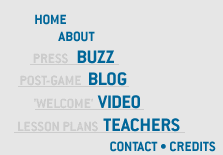LESSON NINE:
Lessons Learned
Introduction
The worst of the oil crisis appears to be over. While prices across the board are still significantly higher than pre-shock prices, the cost of gasoline is down from its peak and appears to have stabilized. Many people crave a return to their lives as they knew them before; others feel we can never really go back, and that to continue the oil dependency of the past is short-sighted and irresponsible. Looking forward, how do we balance our short-term desire for energy's benefits with the long-term risks and costs of procuring it?
Lesson Objectives
Students will:
-
Continue to immerse themselves in the realistic WWO scenario.
- Understand the role that energy use plays in society and culture.
- Evaluate the potential use of alternative energy sources.
-
Understand the complexity of the issues surrounding alternative energy sources.
-
Understand the value of prudent planning and forecasting, both for society and for individuals.
- Continue to develop personal strategies predicated upon anticipated events.
- Continue to reflect on the life changes that would occur in a prolonged oil shortage.
Before the Lesson
- Preview the resource materials (links below).
- Prepare your own "in-game" reaction to this late stage in World Without Oil. What has the oil shortage taught you about your dependence on oil? What energy uses do you feel are absolutely necessary for your quality of life? Looking forward, how do you plan to adjust your life? Blog your in-game reaction, and share your blog with your students.
Part 1: Set the Stage
Student Page for this lesson is here:
http://worldwithoutoil.org/metalesson9s.htm
This page summarizes ideas and instructions for students.
- Re-immerse the students: briefly remind them of what's happened previously in a World Without Oil.
- Read "Pulling into the driveway" by CeeGee:
http://ceegeepeakoil.blogspot.com/2007/05/
pulling-into-driveway.html
- Read "Conservation, our new major fuel source" by PrudentRVer:
http://prudentrver.typepad.com/3catsstalking/2007/05/
conservation_ou.html
Part 2: Take Action
Part 3: Lesson Activity
- Divide students into their groups and have them review the following posts by Gail The Actuary:
- Have each group then develop a 30-year plan to reduce the United State's dependence on oil. The plan should include each year's percentage mix of (a) energy from oil (b) energy use offset by increased efficiency (c) energy from alternate sources and (d) reduced energy consumption. (Students so inclined may want to pair this with an analysis of carbon emissions.) The plan begins in the current year, with energy from oil = 100%. Student groups should either share their plans with the class or post them to their individual blogs for others to see.
- If time permits, have groups present their plans to the class, and have the class discuss the merits, creativity, and feasibility of each. Why would it be difficult or even impossible to convince politicians to enact some of these plans? Have the class vote to select the most efficient and realistic plan.
- Encourage them to do further research on the alternative energies described by Gail. If time allows, you may lengthen this lesson to allow students to gain a greater understanding of the information. Additional information can be found in the Additional Resources portion of the web site.
Part 4: Reflect
Now that the situation is stabilizing, students should be thinking ahead about how to avert future oil crises. Students should reflect upon personal, community, and governmental changes that need to be made. Use the following questions to help guide their reflection:
- How do we balance our short-term desire for energy's benefits with the long-term risks and costs of procuring it?
- What long-term changes does the government need to make to start to break our oil dependence?
-
What can you do to decrease your carbon footprint? How can you motivate others to do the same?
- Will you resist slipping back into old habits? If so, how?
Part 5: Take It Further
Distribute this to your students:
Now that you have time to start thinking about the permanent changes to your lifestyle, what about changing where you get your energy? Illianaspeedstr has started trying find oil-free sources of electricity on the World Without Oil Team Blog:
http://community.livejournal.com/
worldwithoutoil/16312.html
While he did not have much luck, it appears others are finding alternative sources. To take it further today, research where your energy comes from. Does your electric grid draw from a wind farm? Does your energy company allow you to select a green energy source? Make sure to post your findings on your blog. If you can, add photographs, drawings, or video!
Additional Resources
National Standards (McREL)
Overarching (All Lessons)
Standard 44.
Understands the search for community, stability, and peace in an interdependent world
Level IV (Grades 9-12), Benchmark 2:
Understands rates of economic development and the emergence of different economic systems around the globe (e.g., systems of economic management in communist and capitalist countries, as well as the global impact of multinational corporations; the impact of black markets, speculation, and trade in illegal products on national and global markets; patterns of inward, outward, and internal migration in the Middle East and North Africa, types of jobs involved, and the impact of the patterns upon national economies; the rapid economic development of East Asian countries in the late 20th century, and the relatively slow development of Sub-Saharan African countries)
Lesson 9: Specific Standards
Economics
Standard 6: Understands the roles government plays in the United States economy
Level IV, Benchmark 7: Understands that few incentives exist for political leaders to implement policies that entail immediate costs and deferred benefits, even though these types of programs may be more economically effective
Geography
Standard 5. Understands strategies used in natural resource management and conservation
Level IV, Benchmark 5: Knows traditional energy sources (e.g., petroleum, coal, wood) as well as alternative energy sources (e.g., wind, solar, geothermal, hydropower, biofuels)
Standard 18: Understands global development and environmental issues
Level IV, Benchmark 2: Understands why policies should be designed to guide the use and management of Earth's resources and to reflect multiple points of view (e.g., the inequities of access to resources, political and economic power in developing countries, the impact of a natural disaster on a developed country vs. a developing country)
State Standards (All Lessons)
![]()
![]()
![]()
![]()
![]()
![]()
![]()
![]()
![]()
![]()
![]()






